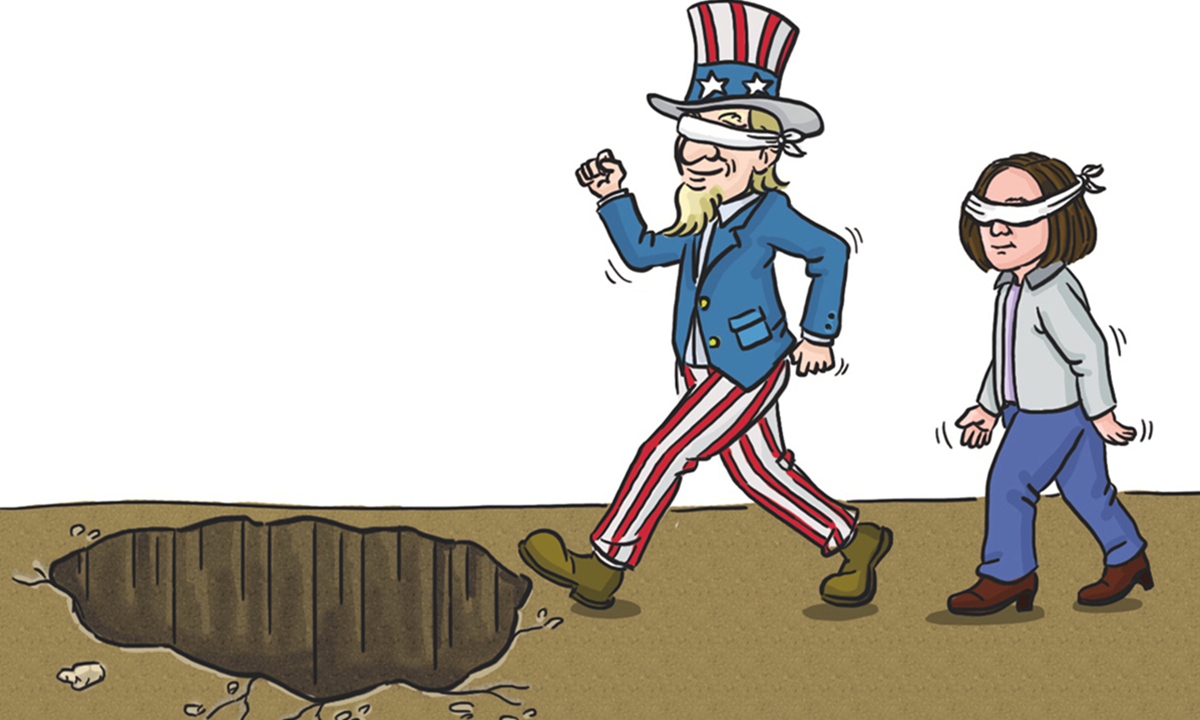
US, Taiwan Illustration: Xia Qing/GT
The US media have recently frequently highlighted the weaknesses of Taiwan's defense. They argue that the US cannot win a war in the Taiwan Straits. For instance, the Washington Post quoted a report from the Washington-based think tank the Center for a New American Security, claiming the US has "few credible options" to respond if China were to seize a set of islands under the control of Taiwan in the South China Sea. A National Interest magazine article entitled "Could the US Lose a War with China Over Taiwan?" also doubted the possibility of Washington winning in the Taiwan Straits if a war breaks out there. Moreover, on October 26, the Wall Street Journal said that the military on the island is worrisome due to its "poor preparation and low morale."
This is a dynamic and objective assessment that the US elites make of the current situation in the Taiwan Straits. After all, the gap between the strengths of China and the US is now rapidly narrowing, especially in terms of the military. During the 1996 Taiwan Straits crisis, Washington deployed two aircraft carrier battle groups to the waters near the island of Taiwan. Now, the US is clear that it can no longer deter the Chinese mainland in such a reckless way. In addition, in terms of determination, China will certainly do whatever it takes to achieve its national reunification. However, The US does not have the will to engage in a direct military collision with the Chinese mainland. It will never sacrifice itself for the sake of Taiwan.
It is already well known that Taiwan's defense is seriously flawed. The island's armed forces are not equipped with the most advanced weapons and equipment, leading to their low combat effectiveness. And the island's "strawberry soldiers" generally do not want to fight with the mainland because the latter's military power is way more powerful. More importantly, they don't know what they will be fighting for. Are they protecting the "Republic of China" - an empty slogan that has been exploited by the Taiwan secessionist forces, or are they fighting for "Taiwan secessionism" that is just an illusion preached by irresponsible politicians?
It is logical for the US media to concentrate on the flaws in Taiwan's defense. Given that cross-Straits relations are now tense, many people, including the Taiwan authorities and those in the US, are wondering if a conflict will break out between the two sides of the Taiwan Straits. Therefore, topics such as the comparison of military power between the two sides of the Straits have naturally become the focus of the media.
Knowing its vulnerability, Taiwan has already taken some actions. In an interview with CNN on October 28, Taiwan regional leader Tsai Ing-wen confirmed for the first time the presence of US troops on the island. She claimed it was to increase the island's defense capability. But even the US military, the strongest in the world, could not make up for the Taiwan island's weaknesses in defense. Especially in terms of the will to fight, the US cannot help Taiwan out of its own psychological dilemma. Besides, in actual combat, modern war emphasizes systematic assaults. The soldiers of the Taiwan military might have learned some tactical and movement skills from a small number of US soldiers. But this will have little effect on modern warfare. Instead, this was done solely for psychological comfort.
Whereas the mainland's military aircraft have frequently flown over Taiwan in recent months, it has generated enough deterrence against the island of Taiwan and the US. But now it seems that the Taiwan secessionist forces and Washington are ready to use the so-called military threat from the mainland as an excuse to continue to challenge China's red line. Therefore, it is believed that the Chinese mainland will definitely increase the pressure on Taiwan and the US. In particular, it will use more means to deter them with greater intensity.
Although Taiwan has become Washington's "wild card," the US policy toward the island of Taiwan will likely be held hostage by radical Taiwan secessionists. By saying one thing and doing another, the US now has sent the wrong signals of conniving or inciting Taiwan secessionist forces. This has made it being dragged into the escalating cross-Straits tensions. In fact, Washington is constantly provoking the one-China principle, the bottom line of China. If the US does not want to be kidnapped by the Taiwan authorities or become a card in their hands, here is the simplest and most effective way to do: The US has to truly implement its one-China policy, explicitly oppose Taiwan secessionism, and leave no room for delusions of Taiwan secessionist forces.
The author is deputy director of the Center for American Studies at Fudan University. opinion@globaltimes.com.cn




